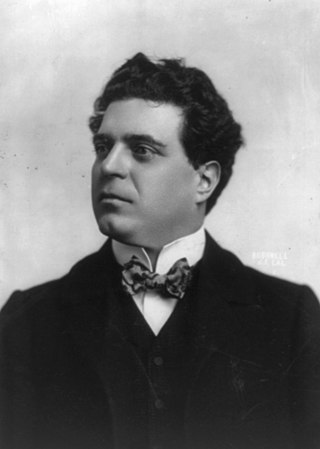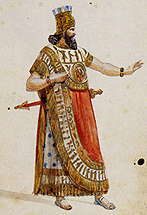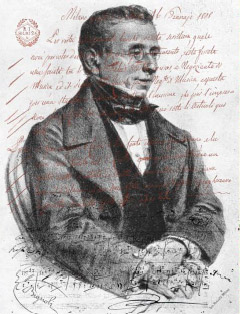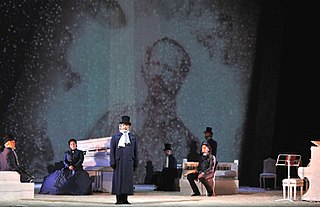See also
![]() Media related to Impresarios at Wikimedia Commons
Media related to Impresarios at Wikimedia Commons
An impresario (from impresa, 'an enterprise or undertaking') [1] is a person who organizes and often finances concerts, plays, or operas, performing a role in stage arts that is similar to that of a film or television producer.
The term originated in the social and economic world of Italian opera, in which from the mid-18th century to the 1830s, the impresario was the key figure in the organization of a lyric season. [2] The owners of the theatre, usually amateurs from the nobility, charged the impresario with hiring a composer (until the 1850s operas were expected to be new) and the orchestra, singers, costumes and sets, all while assuming considerable financial risk. In 1786 Wolfgang Amadeus Mozart satirized the stress and emotional mayhem in a single-act farce Der Schauspieldirektor (The Impresario). Antonio Vivaldi was unusual in acting as both impresario and composer; in 1714 he managed seasons at Teatro San Angelo in Venice, where his opera Orlando finto pazzo was followed by numerous others.
Alessandro Lanari (1787–1852), who began as the owner of a shop that produced costumes, eliminated the middleman in a series of successful seasons he produced for the Teatro della Pergola, in Florence. He presented the premieres of the first version of Giuseppe Verdi's Macbeth , two of Vincenzo Bellini's operas and five of Gaetano Donizetti's, including Lucia di Lammermoor . Domenico Barbaia (1778–1841) began as a café waiter and made a fortune at La Scala, in Milan, where he was also in charge of the gambling operation and introduced roulette.
Duchess Elisabeth Sophie of Mecklenburg [3] was a harpsichordist who also presided over seventeenth-century North German court music as an impresario.
The traditional term is still used in the entertainment industry to refer to a producer of concerts, tours and other events in music, opera, theatre, [4] and even rodeo. [5] Important modern impresari in the traditional sense include Thomas Beecham, Rudolf Bing, David C. Pitman, Sergei Diaghilev, Richard D'Oyly Carte, Fortune Gallo, Sol Hurok, Sarah Caldwell, Andrew Lloyd Webber, Aaron Richmond, and jazz festival producer George Wein. Bill Graham, who produced music shows at The Fillmore Auditorium in San Francisco, was known as a rock music impresario.
The term is occasionally applied to others, such as independent art museum curators, [6] event planners, and conference organizers [7] who have a leading role in orchestrating events.
Jacques Cousteau said of himself that he was an impresario of scientists [8] as an explorer and filmmaker who worked with scientists in underwater exploration. Nicholas Wade described James Watson and E. O. Wilson in The New York Times as impresari of Charles Darwin's works. [9]
![]() Media related to Impresarios at Wikimedia Commons
Media related to Impresarios at Wikimedia Commons

Pietro Mascagni was an Italian composer primarily known for his operas. His 1890 masterpiece Cavalleria rusticana caused one of the greatest sensations in opera history and single-handedly ushered in the Verismo movement in Italian dramatic music. While it was often held that Mascagni, like Ruggero Leoncavallo, was a "one-opera man" who could never repeat his first success, L'amico Fritz and Iris have remained in the repertoire in Europe since their premieres.

The Real Teatro di San Carlo, as originally named by the Bourbon monarchy but today known simply as the Teatro (di) San Carlo, is a historic opera house in Naples, Italy, connected to the Royal Palace and adjacent to the Piazza del Plebiscito. It is the oldest continuously active venue for opera in the world, having opened in 1737, decades before either Milan's La Scala or Venice's La Fenice.

Nabucco is an Italian-language opera in four acts composed in 1841 by Giuseppe Verdi to an Italian libretto by Temistocle Solera. The libretto is based on the biblical books of 2 Kings, Jeremiah, Lamentations, and Daniel, and on the 1836 play by Auguste Anicet-Bourgeois and Francis Cornu. However, Antonio Cortese's ballet adaptation of the play, given at La Scala in 1836, was a more important source for Solera than the play itself. Under its original name of Nabucodonosor, the opera was first performed at La Scala in Milan on 9 March 1842.

Clelia Maria Giuseppa (Giuseppina) Strepponi was a nineteenth-century Italian operatic soprano of great renown and the second wife of composer Giuseppe Verdi.

Oberto, Conte di San Bonifacio is an opera in two acts by Giuseppe Verdi to an Italian libretto by Temistocle Solera, based on an existing libretto by Antonio Piazza probably called Rocester.

I masnadieri is an opera in four acts by Giuseppe Verdi to an Italian libretto by Andrea Maffei, based on the play Die Räuber by Friedrich von Schiller. As Verdi became more successful in Italy, he began to receive offers from other opera houses outside the country. The London impresario Benjamin Lumley had presented Ernani in 1845 and, as a result of its success, commissioned an opera from the composer which became I masnadieri. It was given its first performance at Her Majesty's Theatre on 22 July 1847 with Verdi conducting the first two performances.

Casa Ricordi is a publisher of primarily classical music and opera. Its classical repertoire represents one of the important sources in the world through its publishing of the work of the major 19th-century Italian composers such as Gioachino Rossini, Gaetano Donizetti, Vincenzo Bellini, Giuseppe Verdi, and, later in the century, Giacomo Puccini, composers with whom one or another of the Ricordi family came into close contact.

The Teatro dell'Opera di Roma is an opera house in Rome, Italy. Originally opened in November 1880 as the 2,212 seat Costanzi Theatre, it has undergone several changes of name as well modifications and improvements. The present house seats 1,560.

Jérusalem is a grand opera in four acts by Giuseppe Verdi. The libretto was to be an adaptation and partial translation of the composer's original 1843 Italian opera, I Lombardi alla prima crociata. It was the one opera which he regarded as the most suitable for being translated into French and, taking Eugène Scribe's advice, Verdi agreed that a French libretto was to be prepared by Alphonse Royer and Gustave Vaëz, who had written the libretto for Donizetti's most successful French opera, La favorite. The opera received its premiere performance at the Salle Le Peletier in Paris on 26 November 1847. The maiden production was designed by Paul Lormier (costumes), Charles Séchan, Jules Diéterle and Édouard Desplechin, and Charles-Antoine Cambon and Joseph Thierry.
The San Carlo Opera Company was the name of two different opera companies active in the United States during the first half of the twentieth century.

Apollo Granforte was an Italian opera singer and one of the leading baritones during the inter-war period of the 20th century.
Giovanni Malipiero was an operatic tenor who enjoyed a prominent career on stage and on radio in his native Italy during the 1930s and 1940s.
Luigi Mancinelli was an Italian conductor, cellist and composer. His early career was in Italy, where he established a reputation in Perugia and then Bologna. After 1886 he worked mostly in other countries, as principal conductor at the Royal Opera House, Covent Garden in London and at the "Old Metropolitan" Opera House in New York, and in other appointments in Madrid, Rio de Janeiro and Buenos Aires.
Opera management is the management of the processes by which opera is delivered to audiences. It is carried out by an opera manager, also called a general manager, managing director, or intendant. A multifaceted task, it involves managing an opera company, primarily the singers and musicians who perform the operas, but in many cases also involves managing the opera house in which the company performs.
Luca Canonici is an Italian opera singer who has had an active career singing leading tenor roles both in Europe and his native Italy.

Risorgimento! is an opera in one act by Lorenzo Ferrero set to an Italian-language libretto by Dario Oliveri, based on a scenario by the composer. It was completed in 2010 and first performed at the Teatro Comunale Modena on 26 March 2011.
Carlo Negrini was an Italian spinto tenor and creator of Gabriele Adorno in Verdi’s opera Simon Boccanegra.
Filippo Andrea Francesco Coletti was an Italian baritone associated with Giuseppe Verdi. Coletti created two Verdi roles: Gusmano in Alzira and Francesco in I masnadieri. Verdi revised the role of Germont in La traviata for Coletti, whose interpretation re-defined the role as it is known today. Coletti was, with Antonio Tamburini (1800–1876) and Giorgio Ronconi (1810–1890), one of the three leading baritones of 19th century Italy, an early model of a 'Verdi baritone'.

Giovanni Guicciardi was an Italian opera singer who sang leading baritone roles in the opera houses of Italy and Portugal. He is most remembered today for having created the role of Count di Luna in Verdi's Il trovatore. He created also several other leading roles in operas by lesser known Italian composers. Guicciardi accumulated a considerable fortune during the course of his career. After his retirement from the stage, he taught without payment in music schools in his native city, Reggio Emilia, and presided over a charity for orphaned musicians. He died in San Polo d'Enza at the age of 64.
Feliciano Cristoforo Bartolomeo Strepponi was an Italian composer and conductor. He was born in Lodi and died in Trieste at the age of 38. Amongst his compositions were seven operas which had a modest success in their day. The last one, L'Ullà di Bassora, premiered at La Scala in 1831. He was the father and first teacher of the opera singer Giuseppina Strepponi who later became the second wife of Giuseppe Verdi.